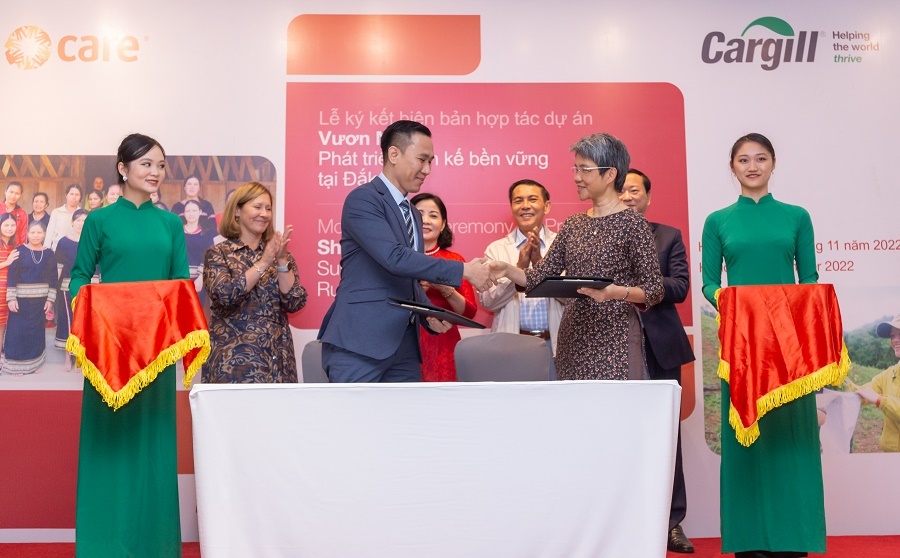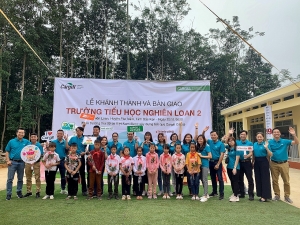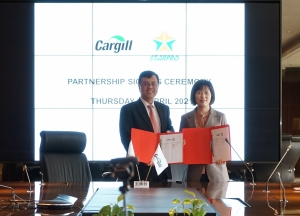Cargill and CARE International partner to improve sustainable agriculture
She Thrives aims to improve sustainable livelihoods among rural smallholders, particularly women and ethnic minorities from Dak Lak province by connecting farmers and producers to the tools and resources they need to enhance their livelihoods sustainably.
This programme focused on the Central Highlands province of Dak Lak will commence immediately and run through August 2024. Over the next two years, it will impact over 15,000 people, including over 7,000 women from the province’s Buon Ho district.
 |
| The partnership between Cargill and CARE International will benefit rural communities in the central-highlands region |
The She Thrives programme will focus on two key areas of change to make a sustainable difference in the lives of rural agricultural producers in the village of Dak Lak. Firstly, by enhancing access to inclusive markets, and secondly, by increasing access to productive agricultural resources and strengthening women's capabilities, confidence, and skills to pursue the economic opportunities that work best for their families.
"Today's MoU signing is a further testament to Cargill’s commitment to the goal of making the world’s food system more sustainable, resilient, and accessible," said Ralph Bean, counselor for Agricultural Affairs at the US Embassy.
"Cargill is focused on Vietnam’s sustainable and innovative agricultural sector and the millions of farmers who contribute to the food security of Vietnam and the world. We at the Embassy are truly proud of the company and the significant economic and social contributions it has been making through programmes such as She Thrives," he added.
Michelle Grogg, vice president of Cargill Corporate Responsibility and executive director of the Cargill Foundation stated, "This is an important programme for Cargill as we continue investing in building resilient and sustainable supply chains in partnership with critical partners like CARE. By working side-by-side with smallholder farmers – particularly women – in communities such as Dak Lak, we are able to implement tailored programmes that connect farmers to markets and, ultimately, improve their livelihoods.”
The programme has set three ambitious goals over its two-year span. Firstly, increasing the productive capacity of rural smallholders, particularly women and ethnic minorities, to pursue sustainable livelihoods. This will be accomplished by convening smallholders into Farmer Field and Business Groups to provide technical training and boost the promotion of entrepreneurship. In addition, a select number of small enterprises will receive seed funding to grow their businesses and receive additional training and support.
Speaking at the launch event, Le Kim Dung, country director of CARE International in Vietnam said, “Aiming at narrowing gender gaps in access to economic opportunities, the She Thrives project focuses on improving the rights of women and marginalised groups. By creating an enabling environment, CARE will work with local people and partners to strengthen women’s capacity and access to economic opportunities and resources, which benefit not only themselves but their whole families and communities. Our cooperation with Cargill will help build not only the farmers’ capacity but increase women’s voice and leadership in decisions related to them.”
The project's second objective is to improve access to finance and financial management capacity for rural smallholder women and ethnic minorities through the development of Village Saving and Loan Associations and the delivery of financial literacy training to group members. The project will also introduce the community to formal financial institutions to assist further with financing their ventures.
Finally, the project aims to enhance access to input and output markets for smallholders by improving their operational efficiencies and supporting bulk buying, selling, and marketing. It will further provide technical support to producer groups and train them on digital skills and the potential that e-commerce may hold for their businesses.
Grogg added, "We are committed to our goal of creating a resilient global food system. Our aim is to provide training on sustainable agricultural practices and improve access to markets for 10 million farmers globally by 2030 through programmes like She Thrives and many more. We will do this by helping smallholder farmers adopt and scale sustainable agricultural practices that build the long-term viability of their farming enterprises and support the next generation of farmers."
Cargill's partnership with CARE goes back more than sixty years and has always focused on taking long-term and sustainable approaches to tackle some of the world's most challenging issues across the food system, such as low agricultural productivity, poor nutritional status, lack of access to formal markets, and limited economic opportunities.
Together both organisations have launched 32 programs across 13 countries, impacting the lives of more than 3.3 million people. The She Thrives launch in Vietnam represents the first programme led by the two organisations in this country.
Locally, Cargill has long supported the central highlands during its 27 years of operations in Vietnam – notably with its Cargill Cares School Building programme, which has already opened 106 schools nationwide.
13 of these are located in remote and mountainous provinces of the central highlands, including five in Dak Lak itself. The She Thrives programme in Vietnam will take this impact forward by to addressing other immediate needs and challenges faced by smallholder farmers at the household and community level in Dak Lak.
 | Cargill boosts closing in on school building target for Vietnamese students To date, the Cargill Vietnam School Project has built 99 schools, with the company realising its goal of building 100 schools in the country by 2020 when it inaugurates the final school in the central province of Nghe An next month. |
 | Cargill swells tapioca starch footprint in Asia Cargill is partnering with Starpro, the leading food grade tapioca starch producer in Thailand, to expand its speciality tapioca starch offerings in the Asia-Pacific region, supporting the product processing requirements of food manufacturers and meeting the sensory expectations of consumers. |
What the stars mean:
★ Poor ★ ★ Promising ★★★ Good ★★★★ Very good ★★★★★ Exceptional
Related Contents
Latest News
More News
- Canada pledges $81 million for initiatives in Vietnam (January 20, 2026 | 11:41)
- KK Group opens global flagship store in Ho Chi Minh City (January 19, 2026 | 11:52)
- Gia Lai draws over $1bn in new investment so far this year (January 19, 2026 | 11:50)
- Unlocking capital flows for strategic and suitable projects (January 18, 2026 | 09:00)
- ACV begins cargo terminal construction at Danang Airport (January 17, 2026 | 15:57)
- Viettel starts construction of semiconductor chip production plant (January 16, 2026 | 21:30)
- Bel expands Vietnam production with $19.7 million investment (January 16, 2026 | 16:07)
- ASML signals long-term commitment to Vietnam (January 16, 2026 | 12:00)
- Ho Chi Minh City starts construction of four key infrastructure projects (January 15, 2026 | 17:22)
- PIDG invests with AquaOne to expand Xuan Mai’s treated water supply to Hanoi (January 15, 2026 | 11:16)

 Tag:
Tag:





















 Mobile Version
Mobile Version